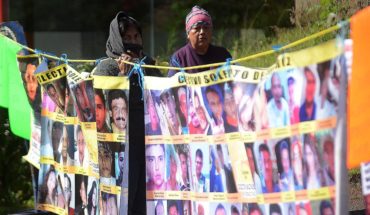
My grandfather was surprised by the coronavirus when he had the vegetables ready for the next day’s fair. He was told that all the neighbors of the commune had to stay in their homes so as not to get the virus that the one the television was talking about. He told us that at 83 he had sun-tanned and cold skin and that many bugs had stung him from a young age, to bit his bare feet and that, because there was no doctor where he lived, his body had become resistant and that no bullets were entering him.
Accustomed to working outdoors throughout his life, his first reaction to confinement was fear; I didn’t understand what to be afraid of, since nothing looked and was obsessed wondering what the bug was like and what he was doing. And one day, he had a panic attack, stopped meeting us and crouched all the quarantine behind the bed, as if he were in the hideout, that of Cerro Centinela, which was his salvation a few decades ago during the dictatorship.
Parapetados in the house, the daily figures of infected and deceased nibb to us and we fear for my grandfather, because, in this war, those of the last line have been the first to fall.
According to WHO, it is being an unimaginable human tragedy around the world. 83% of those who die in Chile are over 60 years old; Nearly 5,500 elderly residences in Spain have died nearly 20,000 people; while in Canada the army, deployed during the pandemic to assist in some residences, concluded a report describing the horror of living conditions and treatment of the elderly. From China to Chile, through Paris, New York, Talca and Brazil, the bug is ravaging, which is what it was given birth to, as has been said.
Confining rhymes with insulation. But the older ones are touch, they’re skin. Of the five senses with which we are born there is one that we probably never lose in our lives: touch. Isolated in their pieces converted into prisons, with the only daily contact of a paramedic with scaffolding, they do not need to watch television to know that something is going on in their residence. Suddenly, steps that come and go fast mix with voices in the hallway, something is not right in the neighbor’s piece. And then an eloquent silence.
Families could not visit them when they got sick and only a few of their own could fire them when they left us. Many left alone, a little more alone than they were. But all the names of the fallen tell, I could say Saramago, like that of Luis Sepúlveda, who will forever remind me that my grandfather, and all our old ones, have not only read us stories, but have written some of the most beautiful love and game stories of our lives.
The coronavirus, which is certain! has done well in thousands of bodies around the world, so he had no reason to mutate, as David Quammen said, let alone become a “good person”, as the former Health Minister Jaime Mañalich ventured, resorting to a parable of political pedagogy as unnecessary as it was clumsy. The ex-minister reminded me that night of 27 February 2010, when the authorities underestimated tsunami risk warning signs in one of the world’s most seismic countries. When the waves had already taken too many bodies, then the alert was declared. For political science teachers, these decision-making or non-decision phenomena in contexts of complexity and uncertainty are extraordinarily interesting to us. We know that uncertainty is part of the engineering of experts as well as the inputs of politicians responsible for making a decision.
This virus, cursed, cruel with those who can defend themselves, by the seams of this patchwork of social protection that we have in Chile has sneaked into the body of our elders.
The social crisis of 2019 and the health crisis of 2020 have revealed that Chile has a serious ethical problem with the elderly, socially and politically evicted before they fell ill with COVID-19. But there is an opportunity to redeem ourselves from this gerontophobia and other serious social problems that we have consensual. The design of a new Constitution is that unique opportunity to build a social protection system based on universal rights, which exceeds the state of media built since 1990 and ends with the commodification of the welfare of retirees.
A political and social pact oriented by three principles is needed: universality of social rights, quality and participation. It’s not that we all have to get to the same point, but a minimum of social protection must be ensured, decent in pensions, wages, health and education. Universality would be at the heart of the covenant for three reasons.
Because of a moral imperative, because it increases productivity, and because it would reduce the risks of social explosion. It can be based on what the ILO recommends on the floor of Social Protection for equitable and inclusive globalization. It would be a state-led pact, for only he can solve social inequalities. A pact that redefines the social responsibilities of the market, the state and the family and gives the State financial capabilities to meet them.
In Chile, average public social spending is 10.9% of GDP versus 20% in the OECD. A tax reform inspired by the principle of fiscal solidarity can be an opportunity for true moral integration into the society of the privileged. A pact that contemplates intergenerational solidarity and distributive and redistributive justice. That it creates institutions that conjure poverty and inequality, of all, of course, of our elders. Thousands don’t have a pension fund to draw a weight from, because in their lives they’ve had the right to survive. According to the Casen survey (2017), 4.5% of older people are in income poverty and 22.1% in a multidimensional poverty situation. Chile’s future economic capacity should not affect the social and political capacity to recognize the right of protection with equity of our elders. It is in everyone’s interest, because the year 2025 will be more than 60 years old in our country than young people under the age of 15.
All claim that in order to the virus a different world opens up. Is the bug dead, no more rage? I’m afraid not. Outside of his piece, the world will be a minefield for my grandfather and for most of the nearly three million older adults in Chile. When the war on the virus ends, deactivation becomes complex, as infamous pensions, drug costs, loneliness and lack of networks are so many other social viruses that will have to get around our elders.
Whatever world is to come, my grandfather, who we believed extinguished in his confinement, has whispered to us today that he does not want to ape of life.
The content poured into this opinion column is the sole responsibility of its author, and does not necessarily reflect the editorial line or position of El Mostrador.





